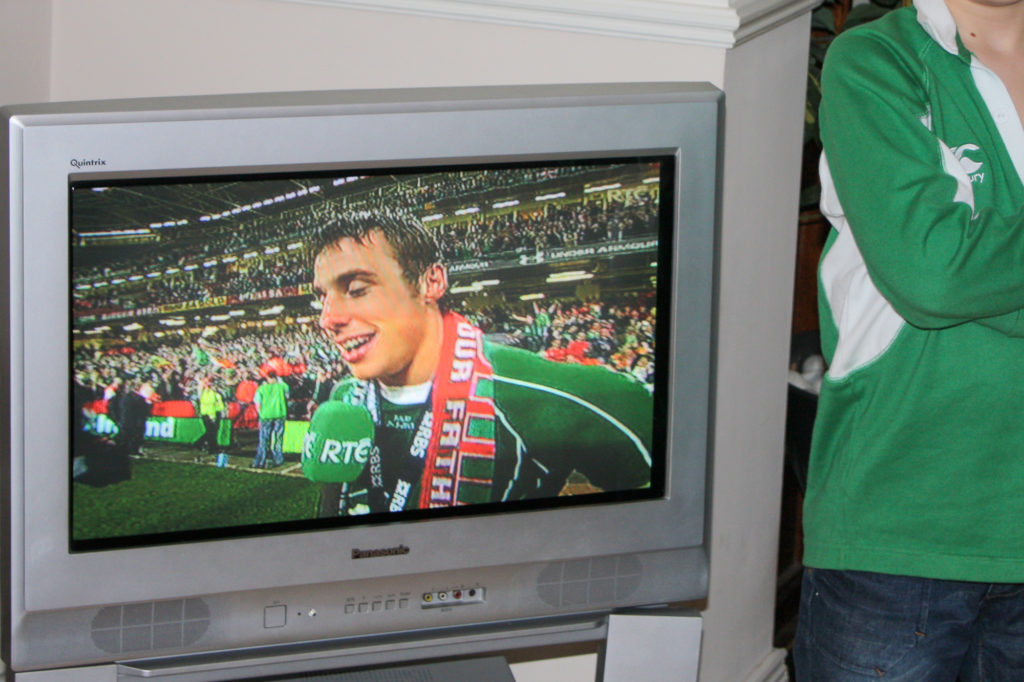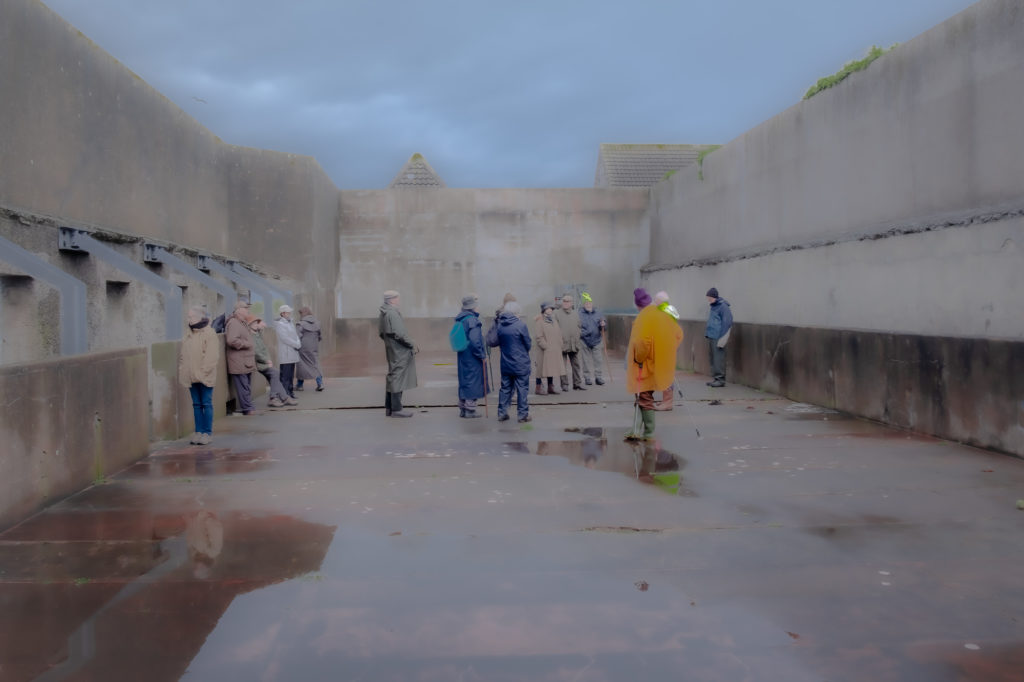Back to 2009 when we were visiting Navan, seat of the county of Meath. The TV was on and it was very tense in the living room. Five of us were speechless with worry. There was a Welshman standing in the middle of a rugby pitch in Cardiff. His job was to kick a rugby ball some 48 metres, to pass between uprights and over a crossbar that holds them in place. He was exhausted, as was every player after 80 gruelling minutes of ferocious, non-stop action.

It’s a coincidence that this story starts in the once Royal County to where the High Kings of Ireland travelled to the Hill of Tara for their coronations and related ceremonies.
It was the last action of the game at the end of the international rugby season here in Europe. A clash of two undefeated teams. The winner would be crowned with both the Triple Crown and the Grand Slam accolade. Wales had home advantage and familiarity with winning ways. They hoped to retain their 2008 garlands. Ireland had not won the Grand Slam for 61 years. Quite a lot was at stake.
I’d like to think that I felt slightly sorry for Welshman Stephen Jones when the ball he kicked passed below the crossbar. I’ll never know because a massive hormonal surge cleansed me of all traces of empathy, something already in deficit. The same organic dopamine rush would have been experienced in the heads of Irish rugby fans in the town, in the county, the country, the island or the global diaspora. We shared a moment, an hour, perhaps a week or a year of euphoria. Winning in international rugby was a novelty.
Unfortunately, I was injured in the closing seconds of the game. My eight year old grandson, quite understandably, gave me a high five. He was standing proud in his Irish rugby jersey. I was sitting. He turned and rushed at me. His high five was by a passing sweep of a hand that carried on past me and the high five continued too. I heard a pop and felt a flash of pain as my hand passed back behind my head and my neck gave way. No broken bones but there was major discomfort. I pretended it was nothing more than a strain. It was his eight birthday and Ireland had just given him a Grand Slam!
Not wishing to annoy him, over ten years later, I must carp that the injury would dog me for more than five years. It took hold intermittently, pain brought on by the repetitive use of computer mouse exacerbated by the many gestures on the touchscreens of newly invented and acquired iPhone. The frequency of episodes increased. I was buying heating pads and polystyrene neck braces for use at home. Eventually the pain became chronic. On one occasion, I had to travel to Texas for a series of important meetings. I went in a neck brace, the only way to diminish the shooting pain in my neck and arm. Everyone I encountered in airports and planes was sympathetic and genuinely helpful. Then, when in a Houston boardroom, my neck really gave out and someone else had to make my pitch for me. You might argue that I shouldn’t have gone. I’d argue, with hindsight, that my obvious discomfort helped display my passion and commitment for the issue I was advocating. Happily, the executives funded the plan.
The final diagnosis was confirmed by MRI. There was a nerve that had popped out of one of my neck vertabrae. Of course, we had no idea of this for over a year as I carried on with life. It was uncomfortable but heck, we had just won the Grand Slam. My father had dreamed of seeing another Slam in his lifetime, having been to Ravenhill in Belfast to see Ireland secure the first by beating Wales the day after his birthday day in 1948. He’d not been able to go to the Paris game in ’48 but he had been to Twickenham where Ireland beat England. He’d found tickets to see Ireland beat Scotland in Dublin a few weeks earlier. By 2009, he was beyond attending the games but watched them avidly on TV. And his dream came to fruition. Wales 15-17 Ireland. Jack Kyle was finally joined by another, by Brian O’Driscoll in a virtual Irish sporting pantheon.
I met a lot of people as a result of my rugby injury. I even had a run in with my GP in London when I asked for a referral to a consultant. I named the consultant I wanted to see as I dropped MRI scans on her desk. ‘The tail is wagging the dog’ she barked at me. So I explained that I’d been in such discomfort waiting over two weeks for this appointment that I’d gone to a private facility in the meantime to get my neck looked at. ‘You did what?’ I paid for an MRI.
Then I told her that I’d also started physiotherapy. I also mentioned that the physiotherapist had recommended I see my GP and that I should try and see a specific consultant. Suddenly it was much calmer. Despite the size of London, they all knew each other.
I had found my physiotherapist though a colleague who had major shoulder problems. His ‘miraculous’ recovery was something he’d talked about and when I started turning up to work in a neck brace, he gave me a name and a phone number.
There were sessions at 7.30 or noon or after 6pm because the physio was allowed use the local hospital facilities outside hours. I was paying because the waiting lists were in months not days. Primarily I was paying because my neck problems were impairing my performance at work.
I went to see the consultant. A South African who played rugby and really knew his business. Another set of scans, sorry yours are good but our viewing software is linked to our machine, and the images confirmed what the physiotherapist had predicted from analysing my physical problems.
More physio. More traction. A visit to a nerve specialist was suggested to rule out damage from repositioned nerves. The nerve specialists methods were simple but effective. He measured the conduction velocity of nerves along my arm by applying a voltage across a couple of electrodes at each end of the limb. He confirmed that the nerve speed in my arm was about average for my age. Around 90 metres per second, as I recall. He was a consultant to the air force pilots and he told me several stories. He told me that pain travels very slowly because the pain receptors and associated nerves are very slight. He told me that he reassures budding pilots with nerve speed facts. He cheers them up telling them that if they crash at the speeds of fighter jets, they’ll never know what kills them because the optic nerve speed isn’t fast enough to transmit the image from the retina to the brain.
The initial physio sorted my neck out after about six weeks. That lasted a year or so until a period of intense work pressure found me relying on my iPhone again. The screen gestures resurrected the problems requiring more serious traction that finally pulled the nerve back into place. Sure, there’s been a lot of muscle adjustment to compensate for the injury but as long as I don’t ignore the stiffening and early pain warnings, the problem is managed.
A nice part of the physiotherapy was that the physio was real tennis player. I think we got on all the better because I knew what real tennis was. I have spent time on a real tennis court. And I had occasion in 2019 to revisit it after an absence of 25 years on an island off the cost of Dublin. The court for what was once known as the sport of kings needs some tender loving restoration.

Rugby is on my mind this evening. The English ruby club Saracens have just left Dublin. Saracens came as the reigning European champions and they played Leinster in a quarter-final this afternoon.
Saracens beat Leinster in the final last year in Newcastle, a game we attended with a few good friends. Leinster had won the competition four times, had never lost a final and better yet, had never been beaten by Saracens. That changed in Newcastle. We had greedily wanted to become the first team in Europe to win the Cup five times, getting ahead of Toulouse, the only other team with four trophies, who we dispatched in the semi-final.
Saracens are in disgrace over financial irregularities and will be demoted to lower level rugby at the end of this season. Leinster won the Pro-14 league last weekend. Leinster and their fans remain greedy for that fifth star, the emblems winners become entitled to put on their jerseys. Saracens’ only path to revenue next season is to win the European Cup. And today, Saracens who have three stars in the last four years, were the better team. For the second season in a row. We’re gutted. And still wondering why Leinster don’t stretch the rules like Saracens. As the TV pundits said when I watched AFL West Coast Eagles in Perth in Australia, you need a touch of the mongrel to win the big games.
Ireland as a nation do not fare particularly well on the international stage. We simply don’t have consistent strong and varied opposition in our leagues that would harden us to the standards required at international level. Yet Ireland’s provincial teams have won seven of the 24 competitions played so far. That’s hard to reconcile.
This year the semi-finals have two teams that have never won playing Toulouse and Saracens. Ideally, for an avid Leinster supporter, the underdogs will prevail and a new name just might be engraved on the cup this year. Finger crossed.

Leave a Reply